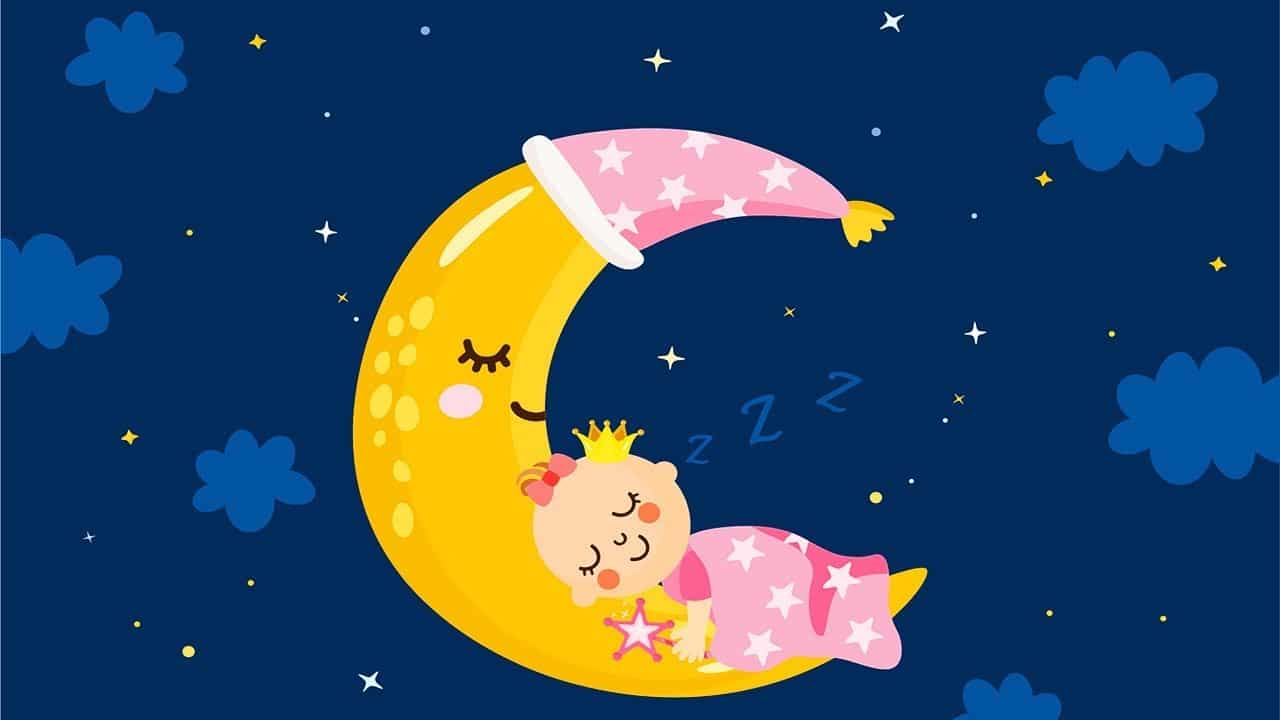There are lots of things that can hinder a child from having a peaceful rest, such as teething, reflux, autism, etc.
But a simple remedy is music. As we all know, music is a sound that is pleasant to the ear.
For infants, sleep is a fundamental aspect of development. Babies must sleep so much because it helps their brains and bodies grow rapidly(quickly).
Music also plays an important role in your baby’s development by achieving restful sleep and a happy mood.
The auditory cortex, located in the temporal lobe of the cerebral cortex, is one of the first portions of the human brain to develop in utero- (uterus). The little one hears its first sound around 16─18 weeks into pregnancy.
The ear begins to form by the 24th week, and the child can recognize his mother’s voice.
Hence, hearing sound becomes a very relevant way for you to stimulate and bond with your child.
You know how you feel when you listen to your favorite song, right? In the same way, babies are wired to respond to music. It helps ease them into a state of relaxation by releasing endorphins.
To explain this easily, Endorphins are natural chemicals produced within the brain and the nervous system to relieve pain or reduce emotional stress. Music helps to relieve stress.
What is a Lullaby?
A lullaby is a quiet, gentle song intended to lure a child to sleep. It is different from other types of music, such as hip-hop, jazz, macosa, juju, etc.
According to Wikipedia, the term lullaby is derived from the Middle English lullen, meaning “to lull,” and by [e] (in the sense of “near”).
The English word “lullaby” is thought to come from the “lala” or “lulu” sounds made by mothers or nurses to calm children. History has it that lullabies are as ancient as mums singing to babies.
Lullabies or cradle songs are simple, repetitious, harmonic songs. They often have slow tempos (beats) and are lyrically short, similar to ballads.
Infants prefer higher-pitched voices and higher-pitched singing as compared to lower pitches. It is not with a high beat like hip pop, instead it is slow and quiet.
Singing, humming, cuddling, patting a baby’s back, swinging, and rocking babies in a rhythmical pattern helps babies rest easily. It also helps nurture and influence babies’ sleeping patterns.
This is because babies and humans are musically inborn, i.e., innate. Music is vital for human physiology development. It stimulates the brain to a large degree.
Studies have also shown that music helps to distract the brain from responding to pain.
Music during pregnancy does have a long-term effect on an unborn baby’s brain. Studies have shown that babies in neonatal intensive care units (NICU) who sing to tend to recover faster and better than those who don’t sing to.
In other words, they have shorter hospitalization times. This is a direct cause of better sleep and feeding. Lullabies help draw the child to a relaxed state, hence sleep.
This is through Music, which inspires emotions. Playing music while your baby falls asleep is not harmful and is unlikely to be a major problem except when the child becomes too dependent on it for sleep.
And no mother would want that right? So, it’s important the music is left for a moderate period of time, and when the child falls asleep, it could be put off, so the child does not get used to it.
You might be too tired to sing from the stress of a day’s work or bothered about how you sound, especially in maintaining a key while singing.
You don’t have to be worried, though, because if you can’t sing, there are lots of available materials online and in hard copy to help you put your baby to bed or sleep.
Depending on what works for you, singing is far preferable to playing an audio lullaby for your baby.
It is important to note that babies recognize a mother’s voice more than her face. Don’t overlook the importance of singing because we live in the 21st century.
Remember that your baby is used to hearing your voice from his conception in the womb. Your voice is the most melodic, soothing, and comforting sound that he knows.
Most of all, the voice will be familiar, creating a sense of security around that child. It is also a bonding time to express love towards the young one. That is what music can do between a mother and a child.
So, singing out loud to your baby is much more effective and preferable than listening to a recording such as a CD, DVD, or YouTube of other people singing.
That way, you can regulate or adjust the pattern or rhythm of the music to attune to the baby’s emotions.
Benefits of Lullabies
Let’s enlighten ourselves with a few benefits of Music and lullabies.
- Music helps a child’s literacy skills. This works by improving vocabulary and introducing and acquiring new words.
- Cognitive ability: Singing can help your baby develop skills in paying attention for longer periods and sustaining concentration.
- Researchers in neuroscience and psychology have shown the strong effect of singing on new babies. Singing is known to improve the heart rate, respiratory rate, sleep, feeding patterns, and weight gain of premature babies.
- Nurturing Bond: Singing involves touching and maintaining eye contact. This strengthens focus and the relationship between the parent and the child. Sing parents have more pleasant times with their kids and can communicate more effectively.
- Lullabies soothe babies when they are upset and provide comfort when they are afraid or stressed. They also brighten the baby’s mood through the release of endorphins. I will use myself as an example. My niece was crying, but when a song was played, she stopped immediately and tuned into a happy mood. That is the power of music; it softens the heart, especially that of a child.
Conclusion
Some popular songs include- Twinkle, Twinkle Little Star, cradle song, bush baby hush, etc. Remember that the baby can remember sounds faster; how about you sing your special song to your precious one today?








